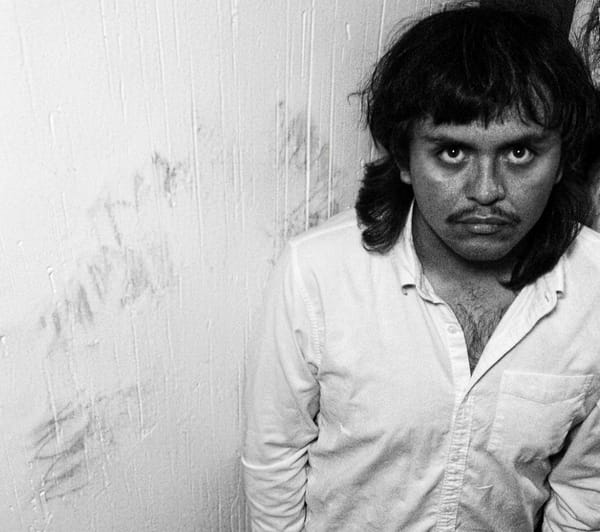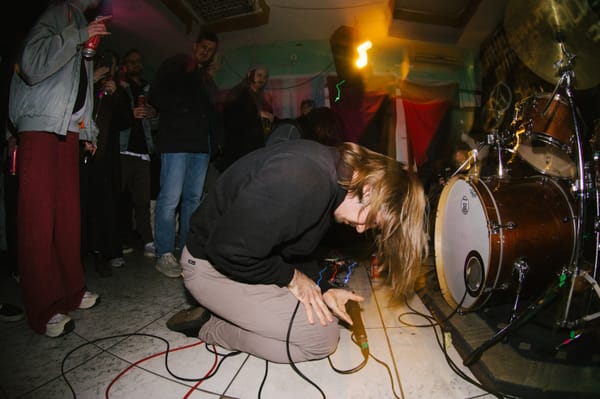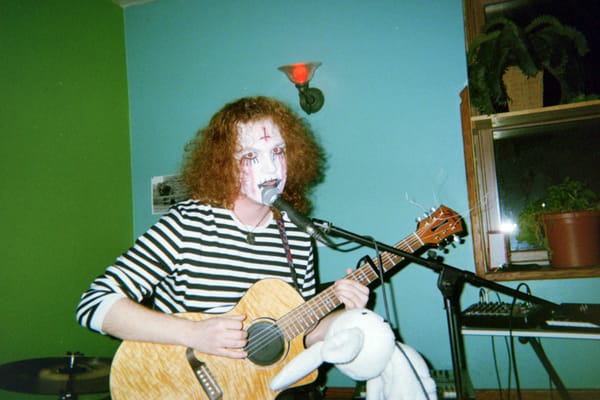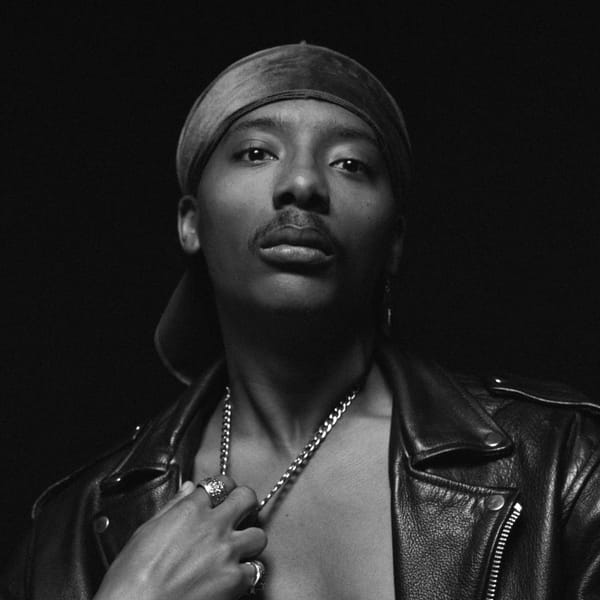I Want To Eat Lava and God Cannot Stop Me talk their debut EP & "tech death indie rock"
Eat Lava are here to tell you about their debut EP, the Minneapolis music scene, and "tech death indie rock."
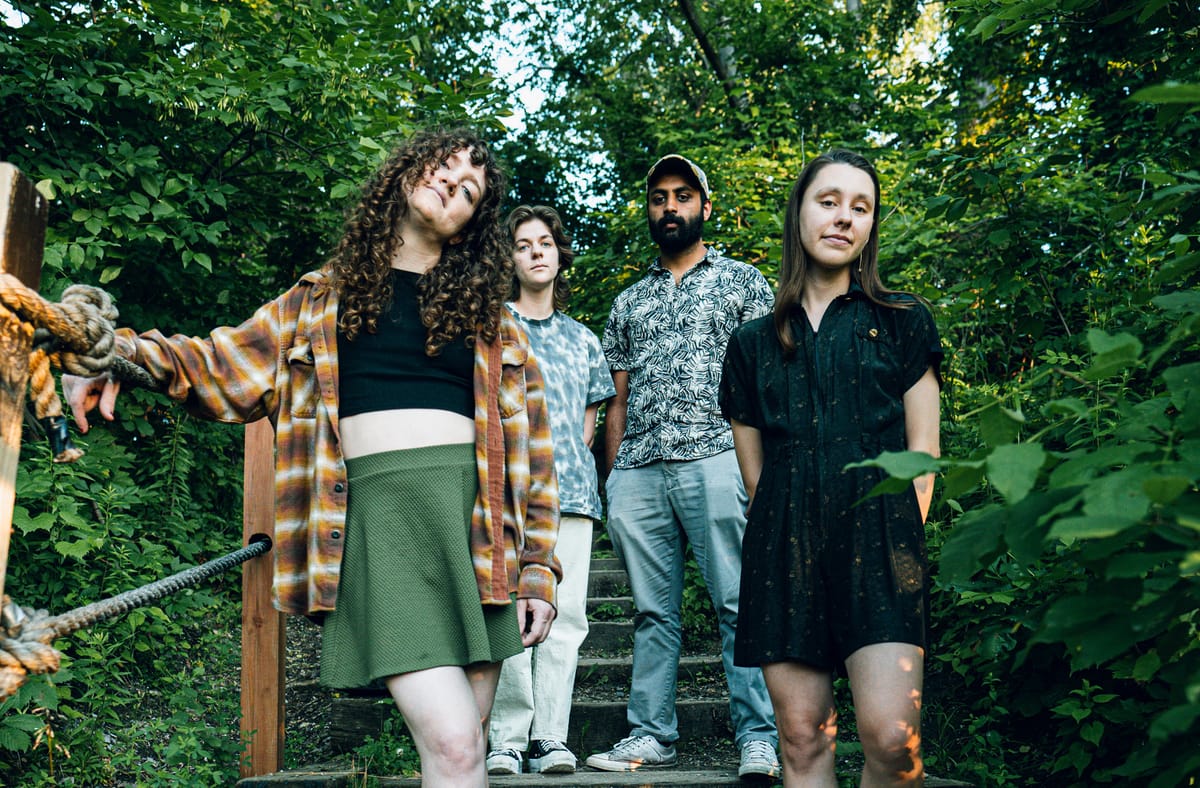
Have you ever listened to an indie rock album and thought to yourself, "okay, this is cool and all, but where are the riffs?"
Don't worry, the Minneapolis band I Want To Eat Lava and God Cannot Stop Me has you covered. Together, Mirii Landsem (vocals/guitar), Ren Brann (bass), Sanath Aithala (drums), and Ally Jacoby (synth/vocals) deftly incorporate indie rock, prog, and metal influences into their sound.
On their debut EP, Do You Care?, Landsem sings about fears, frustrations, and regrets, the melodies around her swell with warmth. A guitar rings out, the time signature changes, a synth lifts the mood, and everything feels okay - maybe even a little hopeful. Somehow, a line like “open your eyes and greet the end” becomes less about impending doom and more about a willingness to confront and adapt.
Eat Lava were nice enough to hop on a Discord call with me to talk about the EP.
How did you guys meet? Were you friends already or did you meet at shows or…?
MIRII: No, I met Sanath on Craigslist, and then Ren was my roommate. And then Ally through Sanath.
SANATH: Yeah, Mirii and I were already in other bands, and she had put out an ad on Craigslist looking for a drummer for a “tech death indie band.” And I was like, “I don't know what that means…” But Mirii had listed a bunch of other bands, and I liked most of them. So I was like, okay, that could be a very fun challenge, to pursue that style of weird indie poppy music.
So what does “tech death indie rock” mean?
MIRII: Well, really I put technical death indie rock to scare away people who just wanted to be in an indie band. And I did list some influences - I think I put like, Palm and Krill and Pom Poko.
MIRII: But it comes down to the riffiness. I mean, there's plenty of indie rock that’s riffy, but for us, I was thinking about metal riffs.
SANATH: And we'll do a blast beat every once in a while, too.
I was actually with Mirii on the day it released, so I heard it for the first time with her that day. Sorry, you had sent it to me before it came out and I forgot to listen to it…
MIRII: It’s okay, I forgive you.
But it got put on in the background while we were hanging out with friends, and I remember immediately thinking that it felt really warm and comforting and nice. Then I listened to it through more fully and really absorbed the lyrics and I was like, “Oh! This is kinda sad!”
MIRII: That's like, my contradiction. I can only write lyrics about things that I'm anxious about or what’s bothering me. I don't know how to write about stuff that's positive.
SANATH: Yeah, our sound is very nice and pleasant. But then Mirii has all these really poetic verses where, when you actually read them, they’re heart-wrenching.
MIRII: A lot of people brought that up. I guess I didn't think about it before because I listen to so much music that has that upbeat sound with sad lyrics.
That was something I really liked about the release, that contrast. I heard it the most with “Jumping.” Because, I mean, lyrically, you’re saying that you feel like jumping out of a window. But when you hear it all together with the instrumentation, it feels hopeful and even freeing.
MIRII: It was planned, but maybe not as super intentional as being like, “I'm gonna make lyrics that don't fit the music.” Usually the song comes together completely before any lyrics are introduced. When I come to the band, I’ll have some lyrics written and an idea of what the guitar is gonna sound like. But everyone brings in ideas and writes their own parts. And then we bounce ideas off and do some jamming.
SANATH: Even when Mirii came in with all the lyrics, each one of us had the opportunity to write what we wanted to write for it. And we trust Mirii to come up with really good parts, and Mirii trusts us to complement those.
I saw that you worked with Anita Velveeta on this. What was it like working with her?
SANATH: First we did the drums with her - that was fun. We recorded in her practice space. It was my first time ever recording drums, so I was a little nervous about how things were gonna go, but I played through the songs, and then everyone else recorded their own parts, and then we went through the mixing process. And, on top of being a very busy musician who writes a lot of songs herself, she was also really quick with the mixing and really receptive to notes. We would send her notes in Instagram messages, and then a couple hours later, she’d be like, “oh, yeah, new version is up on Google Drive!” That was exciting.
Did you record everything with her or just the drums?
MIRII: We made the rest in my bedroom. We recorded each part one by one. It was very DIY. I…probably would not do it like that again.
ALLY: We definitely learned a lot [laughs].
MIRII: Definitely would want to be doing it in the studio with everybody together, but I didn’t know anybody who would do that for an affordable price at the time.
What’s the Minneapolis music scene like?
MIRII: Oh, Minneapolis scene is awesome. I guess I don't really have context because I haven't been in a different music scene, really.
SANATH: But I mean, I've heard anecdotally that in other big city scenes, people are trying really hard to “make it.” In our scene, I feel like everyone's putting out their passion project and not trying to monetize it. It's very organic.
MIRII: We're not in the grind set. We’re just vibers. You don’t hear a lot of complaints about clout chase-y types, at least not where we are. We have several different sub-scenes, but it’s small enough that you know somebody in every sub-scene even if you're not really in it. And it's really easy to do mixed bill shows.
SANATH: We've done shows with two noise acts and then like, drey dk doing dream pop.
MIRII: Yeah. And lots of ambient noise shows with indie bands.
SANATH: And then we’ve played with like, capital P punk bands and hardcore bands.
Can you tell me about the cassette release?
MIRII: Our friend Melvin did them! He has this cybergrind project called 3000 Centipedes.
SANATH: And then our friend Julia [Andreasen] did the album artwork and also did the art for the cassette.
To close out, what’s everyone’s favorite song on the EP and why?
ALLY: My favorite Eat Lava song of all time is “Jumping,” and it was actually really cool to me that you described it as feeling hopeful, because that’s the word I always think of when we get to the very end section. Like you were saying, the lyrics are pretty sad and dark, but then by the last section, the instrumentals feel more hopeful, and the lyrics have this evolution and become more uplifting by the end. And I really love the synth line that I wrote for the end part, that little bit of a variation. It helps carry that tone.
REN: I also really like “Jumping.” It has my favorite bass line that I wrote on this EP, and it's just really fun to play because of all the different time signatures that we go through.
MIRII: I think my favorite song is also “Jumping...” But I’ll talk about a different song because everybody already said that. I was not expecting “Fading” to be the one that everybody likes - that seems to be the most popular one. It's so emotional and really personal. The actual sound of the song, like the melodies, sounds kind of melancholic but not really sad. I was really upset about something and I thought I was going to be writing about this person and all their flaws, and then later, I'm seeing the ways my own flaws were reflected in the way I wrote those lyrics. So it's more about me than that person that I tried to write it about.
SANATH: As the drummer, I really like “Do You Care?”. I remember when Mirii first brought us that song. I heard the transition from the verse of the chorus and I was like, “…I don't know if this actually works.” And then we did figure it out and I thought, “oh, this song is very special.” In the little bridge section I went with a blast beat. And I remember specifically I said, “oh, we can actually do a little bit of metal.” That's one of the only blast beats that I’ve played in any of the bands I’m in, so I really enjoy that song.
Support Do You Care? on Bandcamp, check out their live set over on Ear Coffee, and follow Eat Lava over on Instagram. Header 📷: Katie Kelly
Do you make music you think I'd like? Email it to me at jenn@discfive.com! And if you like what I’m trying to do around here, consider dropping me a tip on ko-fi 😄
This article was updated 4/21/25 to reflect a name change.

